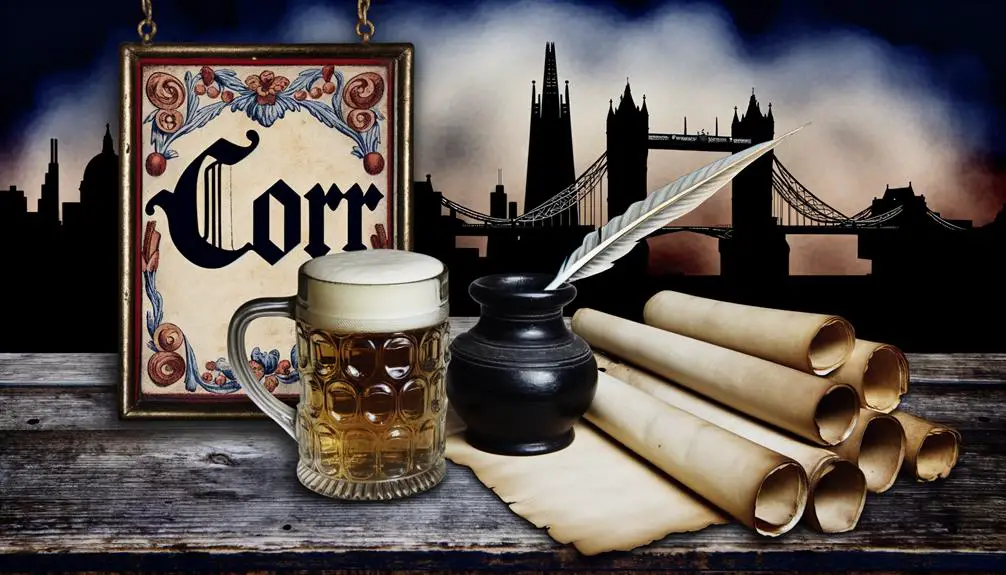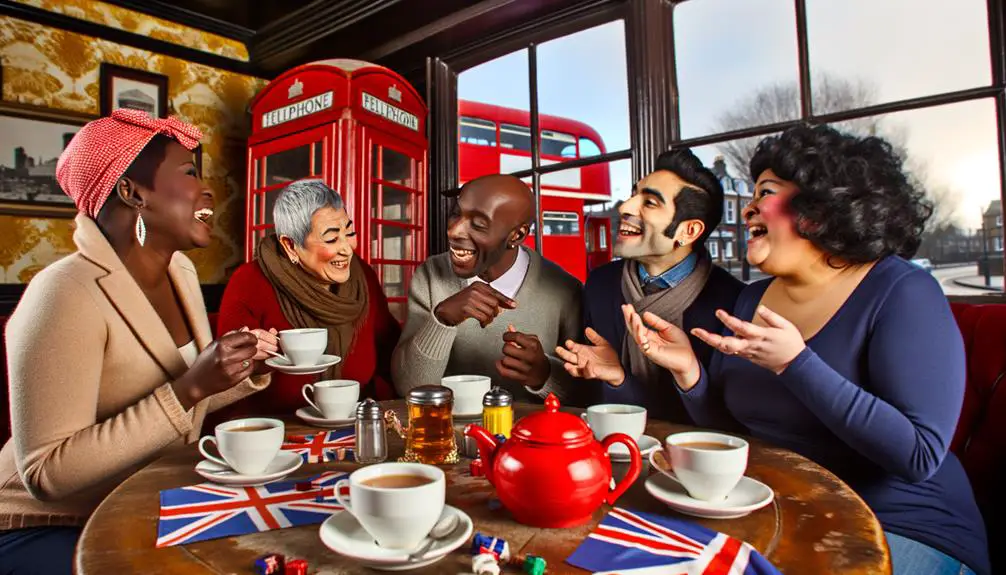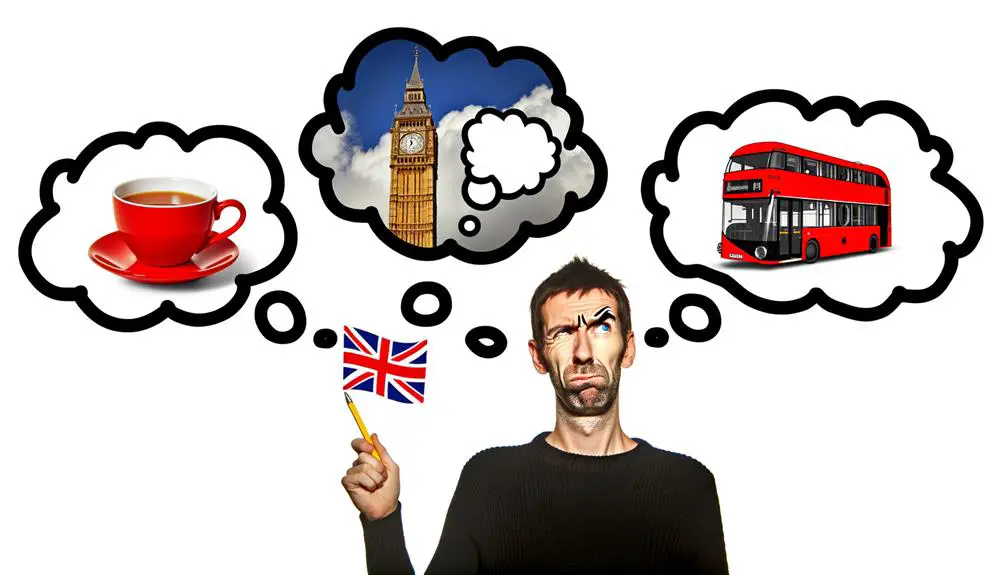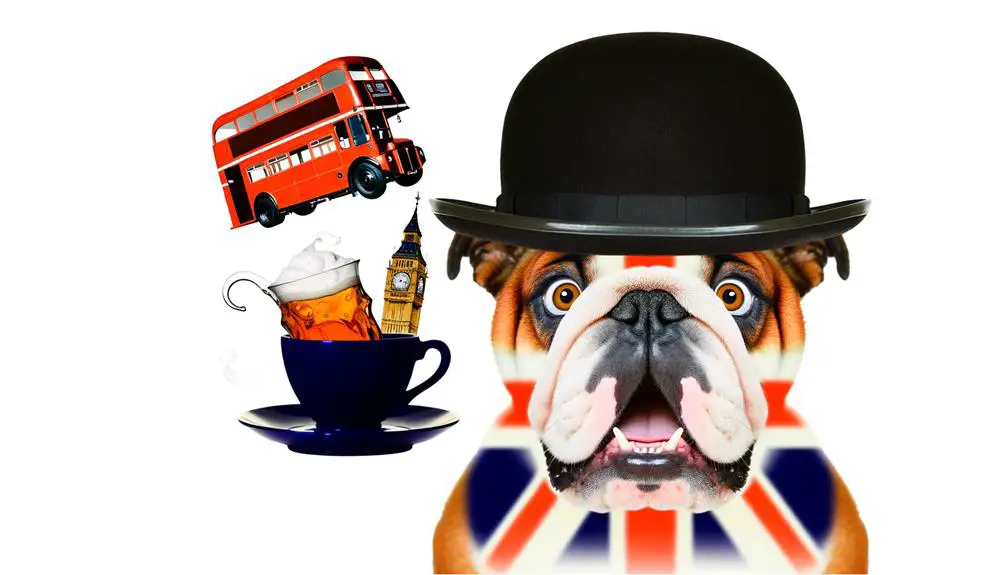In your exploration of British slang, you'll find 'Cor' as a mild, yet evocative term. It stems from an early 20th-century contraction of 'God's body,' reflecting societal shifts from blasphemy to a surprise exclamation. Its pronunciation varies across the UK, showcasing the rich tapestry of regional accents. Traditionally used in informal settings, 'Cor' expresses astonishment or admiration, enriching the lexicon of colloquial English. Beyond its use, 'Cor' connects to cultural identity, indicating how language and geography intersect. Understanding 'Cor' and its nuances offers a deeper appreciation of English linguistic evolution. As you grasp its historical and social context, your comprehension of British slang will grow exponentially.
Key Takeaways
- 'Cor' is British slang expressing astonishment or admiration.
- Originally a contraction of 'God's body,' indicating its blasphemous origins.
- It has evolved into a mild exclamation used in casual, informal settings.
- Pronunciation and spelling are 'C-O-R,' with variations across the UK due to regional accents.
- Often found in colloquial English, enhancing phrases with emotional nuance.
Origins of 'Cor'

One might find it intriguing to discover that the British slang 'Cor' originates from the early 20th century, evolving as a contraction of the expression 'God's body,' which was considered a blasphemous exclamation at the time. This etymological root sheds light on the linguistic evolution that colloquial terms undergo, reflecting broader societal changes and attitudes toward language and propriety.
Delving deeper, the transformation of 'Cor' from a blasphemous outcry to a mild expression of surprise or admiration exemplifies the dynamic nature of language. This evolution is not merely a linguistic curiosity but a mirror to the shifting boundaries of social acceptability and the ongoing secularization of language. The term's journey from a religious invocation to a secular exclamation underscores the complex interplay between language, culture, and societal norms.
Moreover, the etymological analysis of 'Cor' reveals the inherent adaptability of language. As words traverse through time, they are sculpted by cultural, social, and historical forces, often distilling complex origins into succinct expressions that capture the zeitgeist of their era. The study of 'Cor' and its linguistic evolution offers insightful perspectives on the fluidity of language and its capacity to encapsulate changing societal values and attitudes.
Pronunciation and Spelling
The pronunciation and spelling of 'Cor' are deceptively simple, yet they embody the nuanced phonetic shifts characteristic of British slang's evolution over time. Spelled C-O-R, this term appears straightforward. However, its pronunciation can subtly vary across the UK, influenced by the rich tapestry of regional accents. To understand these differences, one must *explore* into phonetic transcription, which provides a more precise depiction of how 'Cor' is articulated in different locales.
In Received Pronunciation (RP), often considered the standard British accent, 'Cor' is phonetically transcribed as /kɔː/. This transcription indicates a long vowel sound, which is key to its articulation in RP. However, when you *investigate* regions with distinct accents, such as the North of England or Scotland, slight variations in vowel length and quality emerge. These regional accents can transform the pronunciation, introducing nuances that phonetic transcription captures effectively.
Common Usage and Contexts

You'll find that 'cor' primarily surfaces in informal settings, serving as a linguistic tool to articulate astonishment or admiration. Its role within casual conversational phrases underscores the fluid dynamics of colloquial English, adapting to varying degrees of surprise and enthusiasm. This usage not only enriches everyday dialogue but also offers insight into the cultural nuances that shape language evolution in the United Kingdom.
Expressing Surprise or Amazement
In British slang, 'cor' serves as an exclamation of surprise or amazement, often used spontaneously in conversations to express a wide range of emotions, from shock to admiration. The usage of 'cor' exhibits notable regional differences across the United Kingdom, reflecting the linguistic diversity within British English. For instance, in some regions, 'cor' might be more prevalent or pronounced differently, offering insights into local dialects and societal norms. Moreover, the emotional intensity conveyed by 'cor' can vary greatly, depending on the speaker's tone, context, and even the relationship between the interlocutors. This variability underscores the word's adaptability and its role in enriching verbal interactions by allowing speakers to succinctly communicate complex emotional reactions, thereby enhancing the dynamism and expressiveness of British English.
Casual Conversational Phrases
Building on our understanding of 'cor' as an expression of surprise or amazement, let's explore how casual conversational phrases, with their common usage and contexts, further contribute to the intricacies of British English. The landscape of these phrases showcases a rich tapestry influenced notably by regional differences and slang evolution. Such casual expressions, often steeped in local culture, offer a window into the social dynamics and linguistic creativity distinct to various parts of the UK. As slang evolves, these phrases adapt, reflecting changes in society, technology, and popular culture. This evolution underscores the fluid nature of language, where phrases once deemed vernacular may gain widespread acceptance, altering their usage and significance in casual conversations. Analyzing these shifts provides insights into the broader patterns of language change and cultural identity within British English.
Variations and Similar Expressions
Exploring the linguistic terrain of British slang, one discovers that 'cor' is but a single expression within a rich tapestry of variations and similar expressions, each encapsulating unique nuances and contexts. Delving deeper, you'll find that regional differences play a significant role in shaping these expressions. For instance, while 'cor' might be universally recognized across the UK, variations like 'crikey' or 'blimey' might be more prevalent in certain areas, each adding a layer of local flavor to the expression of surprise or astonishment.
Moreover, the exploration of international equivalents reveals a fascinating cross-cultural dialogue. Comparable expressions can be found in languages around the globe, from the Australian 'strewth' to the American 'gee' or 'wow'. This global mosaic of exclamations not only underscores the universal nature of such expressions but also highlights subtle differences in the way cultures express surprise, disbelief, or admiration.
In analyzing these variations and similar expressions, it becomes evident that they are more than mere words; they are linguistic markers that reflect societal attitudes, historical influences, and the ever-evolving nature of language itself. Through this lens, 'cor' and its counterparts offer a window into the rich diversity of human communication.
Cultural Significance

Shifting focus to the cultural significance, it's clear that expressions like 'cor' serve as more than mere utterances; they are emblematic of broader societal norms and values. The use of 'cor' showcases how language not only reflects but also perpetuates cultural identity and community cohesion. It's a linguistic marker that denotes a rich tapestry of historical, social, and regional variations, underpinning the diversity within British culture itself.
These regional variations in the usage of 'cor' highlight the complex interplay between language and geography in the UK, where dialects and slang form an essential part of one's identity. Additionally, the social impact of such expressions cannot be understated. They act as a barometer for societal attitudes, values, and even class distinctions, subtly conveying acceptance or exclusion within social groups.
In analyzing 'cor', you're also peering into the heart of Britishness, uncovering how such expressions carry the weight of cultural tradition and social nuance. They encapsulate the collective experience, bridging generations and regions, and reinforcing the social fabric that binds communities together. As a result, 'cor' is not merely a word but a cultural artifact, embodying the vibrancy and complexity of British society.
'Cor' in Media and Literature
Exploring the domains of media and literature, it's clear that 'cor' has carved a distinctive niche, meticulously reflecting and shaping the cultural and social landscapes of the UK. Within the pages of British novels and scripts of numerous TV shows and films, 'cor' emerges as a linguistic tool that encapsulates surprise, admiration, or disbelief, providing a nuanced layer to character reactions that is deeply ingrained in the vernacular texture of the region.
Dialog examples in literature and screenplay writing often employ 'cor' to offer a glimpse into the emotional landscape of characters, serving as a shorthand for a range of sentiments without the need for elaborate exposition. Its usage can subtly convey the socio-economic background, regional identity, and even the temporal setting of a character, enriching the narrative with authentic linguistic flavors.
Moreover, the strategic placement of 'cor' in dialogues contributes to the realism and relatability of characters, allowing readers and viewers to connect with them on a more intimate level. As characters exclaim "Cor, that's brilliant!" or mutter "Cor, what a mess," their reactions become mirrors reflecting the multifaceted human experience, bridging the gap between fiction and reality through the power of a single word.
Learning to Use 'Cor' Correctly

To effectively incorporate 'cor' into your vernacular, understanding its nuances and contexts is essential, guaranteeing accurate and authentic usage. Mastery of 'cor' requires a thorough exploration into its etymological roots and the evolution of its application within British culture. This exploration reveals that 'cor' is more than a mere exclamation; it's a linguistic tool that encapsulates surprise, admiration, or shock. It's imperative to discern the appropriate settings for its deployment. 'Cor' finds its place in informal contexts, thriving in casual conversations amongst friends or in expressive narratives. Its use in formal settings is markedly inappropriate, potentially leading to misunderstandings or perceptions of unprofessionalism.
Navigating the grammatical rules governing 'cor' is equally important. Though seemingly straightforward, its correct placement within a sentence enhances the intended emotive effect, adhering to the syntactic patterns prevalent in colloquial British English. It precedes the statement it aims to emphasize, functioning as a standalone interjection or coupled with a comma for effect. Understanding these guidelines ensures that you're not just mimicking British slang but integrating it into your language repertoire with the finesse and authenticity of a native speaker.







